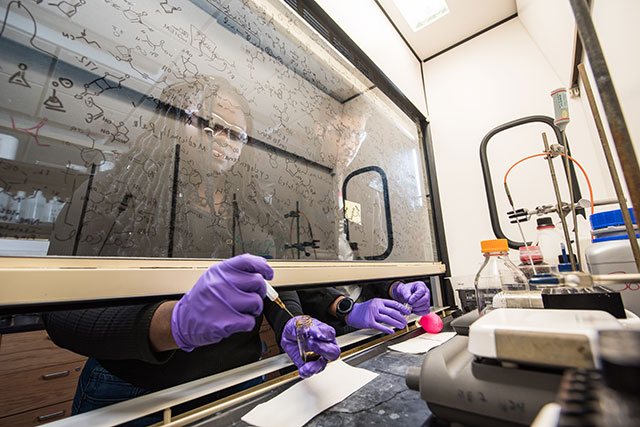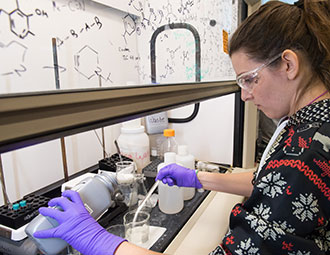Impactful research in higher education with the potential to make a real difference in society is something generally associated with doctoral universities and conducted by postgraduate students.
But at Florida Gulf Coast University, undergraduate students have the chance to jumpstart their scientific destiny even before they earn their bachelor’s degree. And for those who take advantage of that opportunity, the short- and long-term benefits can be rewarding.
Take Dr. Greg Boyce’s team of student researchers, which the associate professor of chemistry calls the Boyce Research Group on his website. Team members get a unique chance to work on meaningful research projects before they graduate, present the fruit of that work at conferences, obtain great research experience for their resumes and often go on to graduate-school acceptance and scholarships from leading research institutions.
And by the way — they also get to work on research projects that could lead to discoveries that help improve all of our lives, thanks to their work ethic and the financial support from grants such as those provided by the Seidler Fund and Whitaker Center for STEM Education.
The ongoing research takes place in the lab on the fourth floor of Seidler Hall. There, you’ll find students wearing rubber gloves trying, as Boyce describes it, “to invent new reactions that can make important classes of molecules efficiently, synthesizing medicinally-relevant natural products — intricate molecules made by plants — in a concise manner, and developing new reactions with vitamin B6 and exploring its utility as a chemical-delivery system.”
The way Boyce explains it, many medicines on the market are derived from natural products that are in short supply, so organic chemists find creative ways to make them. One example he uses is the cancer-treatment drug Taxol, which is derived from the bark of the Pacific yew tree. “Organic chemists had to come up with a way to synthesize it to make enough in the lab to treat people,” Boyce said.
If you’re confused, rest assured that student researcher Daniel Quiroz of Naples, a senior biochemistry major, understands what he’s trying to accomplish.

“For me, it has been eye-opening to see what an actual research experience is like,” said Quiroz, who hopes to one day earn a doctorate in chemistry and perhaps pursue a career in the pharmaceutical industry. “I’ve learned so much here; this has really intensified my passion for science. By getting to do hands-on work in the lab, I’ve learned what’s possible after I graduate.”
The opportunity to, as Boyce puts it, “focus on antibiotic activity in natural products … make complex structures for biological testing for potential medicinal use later and make them scalable enough to create the supply to meet the demand,” is a gift that FGCU undergrads appreciate.
“Here, the undergrads do cutting-edge research. There’s nobody over them except me, so they get the one-on-one mentoring experience and get to do the entirety of the work,” said Boyce, who also points out that getting to be co-authors on publications is a rare accomplishment for undergraduate students, one that helps them greatly in reaching future goals or to gain admittance to medical or professional schools.
Boyce can relate to the benefits of faculty mentorship. The Pittsburgh native grew up in Fort Lauderdale before beginning his own academic journey, and in his biography on the research group website, he credits the mentors under whom he studied along the way: professors Philip Parsons at the University of Sussex in Brighton, England; Craig Hill at Emory University in Atlanta; and Jeffrey Johnson at the University of North Carolina. Now, as the research tree branches out, Boyce’s name likely will be included in the bios and resumes of the Eagles he mentors, some of whom said they switched career paths after working with him.
Marie Bozor, a senior biochemistry major originally from Haiti who, like Boyce, grew up in Fort Lauderdale, calls working with the research group the “most rewarding experience.”

“I never thought I would be doing anything like this,” said Bozor, who considered going to either the University of Florida or Columbia University before deciding to stay closer to her family by attending FGCU. “I had planned to do premed, but after taking organic chemistry, I realized how much I love working with chemicals. Now, med school is out of the picture. I’m going to grad school and hope to earn a Ph.D. in organic chemistry.”
Two Port Charlotte High School graduates also have experienced career-altering experiences doing research at FGCU.
“I didn’t realize I was going to love organic chemistry so much … this has been just awesome,” said senior Jacob Foster, who’s earning a biology major and chemistry minor and hopes to one day pursue orthopedics or pediatrics in medical school. “This experience has really helped me excel in my other classwork, develop confidence in my independent critical-thinking skills and learn to take the knowledge in my head and apply it to real-world problems.”
The other Port Charlotte grad is the only member of the team Boyce is losing this year: Brittany Klootwyk, who graduated in May with a degree in biochemistry and heads to the University of Pittsburgh in June, where she’ll pursue a doctorate in organic chemistry. Going back to Boyce’s statement that research experience opens infinite doors for students, Klootwyk is literally the poster girl for such accomplishment, having won the 2018 award for best undergraduate presenter at the prestigious FloHet Chemistry Conference in Gainesville to go with her acceptance into a Ph.D. program at Pitt.
“I really wasn’t expecting to get the opportunities that I got here,” said Klootwyk, who has worked with the research group since 2016. “After I started working with Dr. Boyce, I switched my track from biology. I love spending time in the lab … you’ll always find us hanging out here because we love it. The experience made me realize how much I love research, and it got me into graduate school and set my career path.”